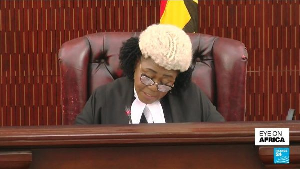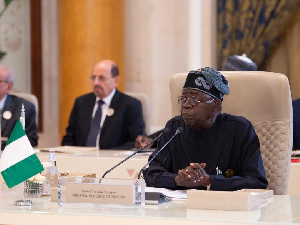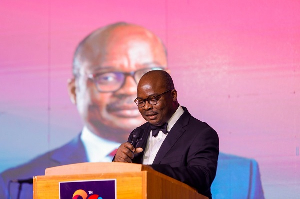By Gary Al-Smith, SuperSport.com
The resignation of Orlando Odartey Wellington from the national under 20 team seemed to be a popular public decision, but the Chairman of the Black Satellite's Management Committee has expressed his frustration at the state of affairs.
George Afriyie is not happy with the way Wellington was "hounded out of the job" without grounds. Afriyie was furious as he spoke especially about the media's role in the sacking of the gaffer. His interview was conducted in the Akan language, and SuperSport.com has tried to be as accurate in translation as possible.
"The media is entirely at fault for all this," he said on Peace FM in Ghana's capital in an interview aired on Wednesday morning. "You journalists make things out of nothing. On what basis were you all clamouring for him to be sacked?"
Public opinion had suggested that Wellington had been given a chance to prove his mettle in major past competitions and failed, as he followed them up with a series of poor results more recently. In a separate interview, Kwasi Oteng-Appau, a journalist, summed up the public sentiment for SuperSport.com.
"Wellington was not doing himself any favours with the way he even started assembling the team from scratch. He went for nineteen foreign based players for a national under 20 team. Who does that, especially when there's plenty local talent to be developed at that level?"
But in his Peace FM interview, Afriyie questioned the merit of journalists' claims of representing public opinion as being without grounds. "It was not a question of what the public think or thought," he charged. "Troublesome journalists set the agenda that the man was not doing well, which is not true." 2011, the beginning
Ghana went into the last African Youth Championships with swag and respect, following the heroics of 2009. Three games into the competition, the Satellites were out. It is from here Orlando Wellington's series of excuses can be traced.
"These are the best players in Ghana we selected for the tournament," Wellington said after Ghana had crashed out of the African Youth Championships. "Our goalkeeper and one of the central defenders play high level football in Ghana."
And then he complained: "We cannot have players with the same qualities at all times." This interview was reported by Cafonline, the official online mouthpiece of the Confederation of African Football.
The coach then pointed out that he had been denied the services of Olympique Marseille's budding striker Jordan Ayew and the Italy-based duo of Daniel Kofi Agyei and Afriyie Acquah for the tournament. He believed his lads were unlucky to snatch one of the four qualification berths for the World Cup played later in Colombia.
"We fought hard but we were not successful in all three games during the first round. We also found out that most were well prepared. All our games were not easy. It is unfortunate that as defending champions, we have to go out. With respect this game, I must say that Cameroon played well. I wish them good luck for the rest of the competition." Second chance begins
As part of a shakeup of the various national teams, the Ghana Football Association swept those unpleasant memories under the carpet. And so in May this year, Wellington was made boss of the team again, against public grumblings.
He chose his technical team. Then he set about building a squad for the battles ahead.
First, was the hugely publicized Under 20 friendly tournament to be played in South Africa at the end of that month. But before that, the Satellites were chosen to play a match to commemorate the May 9 disaster. They were beaten 3-0 by the national Under-17 team.
Rainbow tragedy
Following that queer loss, Orlando Wellington named a 21-man squad made entirely of home-based players. Five players were drafted from the second tier league and, together, they flew down south.
Ghana played three matches in the Invitational - winning one. When he returned from South Africa, the gaffer challenged opinion that he did not do well, arguing that the circumstances were not favourable.
Indeed, after Ghana lost to South Africa in the final game, the coach's explanations were interesting. He blamed the referee. And then blamed his players.
"I’m disappointed with the referee. Our goalkeeper was pushed for the corner and from there they scored their first goal," the Associated Press quoted Orlando as saying of the match handling by referee MatheolaMakhobalo from Lesotho.
He then, again, rounded up on his players.
"We did not approach the game the right way, mentally we were sluggish. South Africa were more determined most especially in the first half. Their numbers 7 [Snethemba Ngidi] and 6 [Jino Moeketsi[ were everywhere in midfield, with or without the ball, they impressed me. They have a bright future ahead of them."
So, what was Wellington's answer to his "mentally sluggish" team?
Going foreign
To justify his verbal claims that his players were "mentally sluggish" and his tacit version that they were not performing, Orlando looked outward and beyond the shores of Ghana. He invited nineteen foreign-based players for a non-residential camping exercise from June 9 at the Presbyterian Boys' High School Park in Accra.
Two days later, Wellington said that he was making headway in the player selections.
"In fact it has been a little bit encouraging. You can see that most of them when they break from Europe they came and started enjoying themselves, they were not training because they came for holidays," he told GHANAsoccernet's Ameenu Shardow.
"You can see some too are really ready that when they are asked to play a match they can withstand the task. Few of them are playing very well, they have the ideas of playing very good football. The way they move without the ball, they way they move with the ball, you can see they have something good to offer."
The coach was hopeful that where locals had failed, the more technical batch will redeem the nation.
Afriyie's beef
The Chairman of the Satellite's Management Committee said, in the interview mentioned earlier, that he was frustrated because Wellington was not treated fairly. "The man has not played any competition since he was made coach this time round, so why are people saying he is not competent?"
Afriyie conceded that though Wellington may not have been stellar in the friendly internationals played till date, they were not official games and hence were still testing periods. He argued also that the media were feeding the public with the perception that Wellington was tactically not good, which was also not true.
However, two final pieces of evidence show that Wellington is wrong in feeling aggrieved. Both pieces of evidence have to do with his reactions after recent defeats. They are indecisive, at best, and self-immolating, at worst.
The Benin caper
"We have accepted a friendly from Benin who will be on a West African tour," he told Accra-based Asempa FM. "We think it will be very good for us as we prepare for our Under 20 qualifier. We hope to be ready by two weeks time for our first game against Uganda."
This was Wellington before playing a preparatory friendly on June 30. After the 0-0 game at the Tema Stadium, which by all accounts was a listless showing, the coach said there was no need to panic. The explanation he gave would have been laughable, if it was not so serious. Wellington said the loss was all part of the plan.
"I don't think I have a problem. It is all part of my preparations," Wellington told reporters. "I am hoping for the best crop of players for the crucial match in Kampala so we are trying to get the team in shape."
The final straw
The Ghana FA put together a three nation tournament this week as a final warm up for the Satellites. They got Namibia and Egypt to agree to play a game each with the lads on home soil, starting Sunday.
Ghana promptly raced to a 2-0 lead soon after the first game with Namibia began. By the match's end, it was 2-2. Reporters waited for Orlando's verdict and it came in predictable waves.
"I was not impressed. If you look at the way we allowed them to come in from the free-kick, the boys did not do well. To avoid problems, I had to change them," Wellington is quoted by the official FA website as saying.
Most stupefying of all, he blamed the under 17 team that failed to get to the last junior World Cup. "The Under 17 team failed to qualify for the World Cup and so when they were disbanded we did not have a crop of players to inherit from," he added.
He had forgotten that this same under 17s had thrashed him only 61 days before. And then he asked for more time.
"People should be patient with us and I'm sure things will be alright. As you know, building the new team has not been easy, especially with the whole age-grade process these days."
Untenable
In resigning, the man has saved himself further trouble.
Maxwell Konadu has been given temporary charge of the side. How he can breathe life into these tepid waters in such a short time will be seen. SuperSport.com sought the opinion of Oteng-Appau, who defended the public opinion and that of the press on the resignation of Wellington, again.
"It was clear from every indication that the team was going downhill. Should the public and journalists have waited for another Wellington-led team to crash out of yet another competition?"
And that is the poignant point. Ghana plays Uganda in a crucial African Youth Championships qualifier soon. Wellington has not inspired confidence, and has not given hard evidence for his players' lack of cohesion and drive.
All we have had from Wellington have been a history of excuses.
Gary Al-Smith is editor of SuperSport Ghana.
Twitter: @garyalsmith
Sports Features of Thursday, 12 July 2012
Source: gary al-smith/supersport.com
















